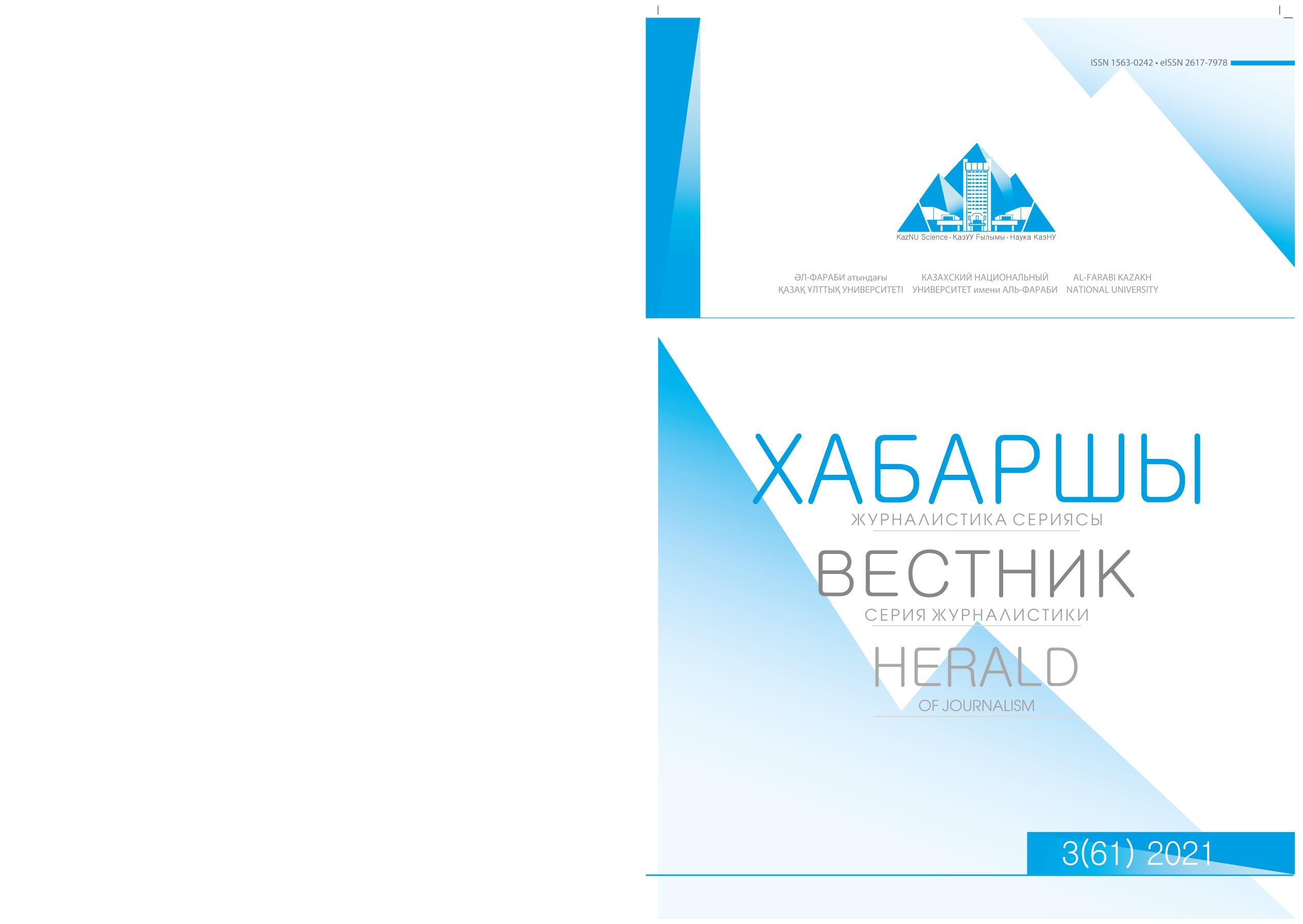Correlation of the environmental consciousness of kazakhstanis due to the pandemic
DOI:
https://doi.org/10.26577/HJ.2021.v61.i3.04Abstract
The topic of the research is devoted to the study of changes in the environmental consciousness of Kazakhstanis in connection with the pandemic. The text of the study answers to such questions like how does the massive use of social networks in a pandemic affect the nature of the perception of information and the further reaction of users to events.
The aim of the study is to show how social networks are moving away from the role of a tool. And its conceptualization is already shown as an aggregator of public opinion in techno-cultural relations. Accordingly, this article examines the tendency of changing the environmental consciousness of Kazakhstanis during a pandemic.
The scientific significance of the study lies in the topic itself, the importance and role of social networks in the formation of the main trends and themes were determined. Findings were done by studying the main platform for the dissemination of environmental ideas - the social network Instagram. The article used research methods such as interviews, as well as empirical research methods such as observation and comparison (in social networks). The research was helped by such qualities and advantages of Instagram as hashtags (#airpollution, #plasticpollution #кобейтуз), popular news that were in the rank of the most discussed and sent to other users. As part of the study, interviews were conducted with the owners of the recycling business.
The article discusses the hypothesis that during the pandemic, activity on social networks increased significantly, which led to an intensive discussion of environmental topics in Kazakhstan.
This work has an important research component and can be assessed by experts in the field of public opinion research, as well as this article can be a learning base for students and novice specialists.
Key words: ecology, youth, social networks, ecological consciousness, pandemic.
References
Balashova A, Skobelev. V. Pol'zovateli stali chashche lajkat' i sidet' v socsetyah s komp'yuterov. 16 aprelya 2020. Technology and Media. https://www.rbc.ru/technology_and_media/16/04/2020/5e98175d9a7947beb10bf01d
Bolton, R., Parasuraman, A.,. (2013) Understanding Generation Y and their use of social media: a review and research agenda. https://www.emerald.com/insight/content/doi/10.1108/09564231311326987/full/html
Cinelli, Matteo. Quattrociocchi,Walter. (2020). The COVID-19 social media infodemic. https://www.nature.com/articles/s41598-020-73510-5
Gao, Junling. Zheng, Pinpin. Jia, Yingnan. (2020). Mental health problems and social media exposure during COVID-19 outbreak. https://journals.plos.org/plosone/article?id=10.1371/journal.pone.0231924
Hansen, Anders. (2011). Communication, media and environment: Towards reconnecting research on the production, content and social implications of environmental communication. https://journals.sagepub.com/doi/abs/10.1177/1748048510386739
Kai Zhang, Jerald L. (2012). E-Waste Recycling: Where Does It Go from Here?. https://pubs.acs.org/doi/abs/10.1021/es303166s
Kay, Samuel. (2013) Can Social Media Clear the Air? A Case Study of the Air Pollution Problem in Chinese Cities. https://www.tandfonline.com/doi/full/10.1080/00330124.2014.970838
Nurgabylova A.SH. (2020). Osobennosti ekologicheskogo obrazovaniya molodezhi v Respublike Kazahstan.. Vestnik Orenburgskogo gosudarstvennogo universiteta.
Ul'yanova N. V. (2007). Ekologicheskoe soznanie i ekologicheskaya kul'tura, problemy i perspektivy.. Vestnik Tomskogo pedagogicheskogo universiteta.
Sujataa, Muniandy. Khorb, Kuan-Siew. (2018). The role of social media on recycling behavior. https://www.sciencedirect.com/science/article/abs/pii/S2352550919300041
Serikbaev, D. Blagodarya karantinu vozduh v Almaty stal namnogo chishche: pravda ili mif? 2020. Forbes.kz. [https://m.forbes.kz/process/expertise/dumaete_chto_blagodarya_karantinu_vozduh_v_almatyi_stal_kardinalno_chische_vyi_oshibaetes/]
Sergeeva, YU. Kak COVID-19 izmenil internet i nas — socseti i onlajn-ritejl posle pandemii. 11 sentyabrya 2020. WebCanape. [https://www.web-canape.ru/business/kak-covid-19-izmenil-internet-i-nas-statistika-interneta-i-socsetej-posle-pandemii/]
Prime minister – informacionny`j portal (2020). Rost trafika messendzherov, premial'nyj paket telekanalov i razvitie sistem svyazi — kak rabotaet v strane internet v period CHP. 15 aprelya 2020. https://primeminister.kz/ru/news/reviews/rost-trafika-messendzherov-premialnyy-paket-telekanalov-i-razvitie-sistem-svyazi-kak-rabotaet-v-strane-internet-v-period-chp-1531959
We are Social – Global socially-led creative agency. (2020). https://wearesocial.com/
Zhang, Xiaowei. (2020) Designing tourist experiences amidst air pollution: A spatial analytical approach using social media. https://translate.google.com/?hl=ru&sl=en&tl=ru&text=Designing%20tourist%20experiences%20amidst%20air%20pollution%3A%20A%20spatial%20analytical%20approach%20using%20social%20media&op=translate
Electronic resources:
AlmatyToday – informational account. (2020). https://www.instagram.com/p/CAcPqdIBWRx/?utm_source=ig_web_copy_link
AlmatyToday – informacionnyj akkaunt v Instagram. (2020). V RK zapustili goryachuyu liniyu dlya soobshchenij o stihijnyh svalkah. https://www.instagram.com/p/CCv1r3ehfp9/?utm_source=ig_web_copy_link
Esimhanov E. – lichnyj blog v instagram. (2020). O Kok ZHajlau.https://www.instagram.com/p/CAnevvQHC8U/?utm_source=ig_web_copy_link
eMarketer (2018). Social Network Users and Penetration in Worldwide. Retrieved from https://tinyurl.com/ycr2d3v9.
Facebook (2019). Company Info. Retrieved from https://tinyurl.com/n544jrt.
KazNews – informacionnj portal. (2020). CHto stanet s nashej planetoj ili punkty priema vtorichnogo syr'ya v gorode Almaty.
Nur.kz – instagram. (2020). Goluboe nebo, chistaya voda: kak vyglyadyat krupnye goroda do i posle pandemii. 25 aprelya 2020.https://www.instagram.com/kaznews/
Appendix 1




